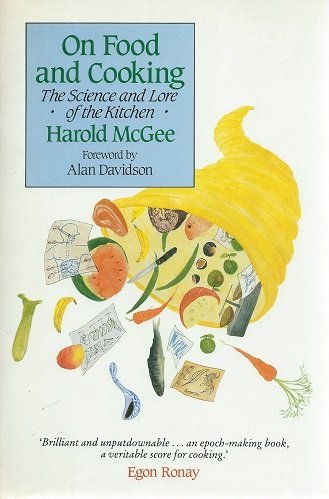Items related to On Food and Cooking: The Science and Lore of the Kitchen

Synopsis
On Food and Cooking is a unique blend of culinary lore and scientific explanation that examines food -- its history, its make-up, and its behavior when we cook it, cool it, dice it, age it, or otherwise prepare it for eating. Generously spiced with historical and literary anecdote, it covers all the major food categories, from meat and potatoes to sauce béarnaise and champagne. Easy-to-understand scientific explanations throw light on such mysteries as why you can whip cream but not milk; what makes white meat white; whether searing really seals in flavor; how to tell stale eggs from fresh; why "fruits" ripen and "vegetables" don't; how to save a sauce; what hops do; and what happens when you knead dough. A chapter on nutrition reveals that Americans have been obsessed with their diet since the 1800s and exposes the fallacies behind food fads past and present. There's a section on additives -- a not-so-new addition to food -- and taste and smell, our two pleasure-giving versions of the oldest sense on earth. With more than 200 illustrations, including extraordinary photographs of food taken through the electron microscope, this book will delight and fascinate anyone who has ever cooked, savored, or wondered about food.
"synopsis" may belong to another edition of this title.
Review
What makes white meat white? Does searing really seal in flavor? Why is it that fruits ripen but vegetables don't? These and other food mysteries are conclusively solved in Harold McGee's On Food and Cooking: The Science and Lore of the Kitchen. A unique mix of culinary lore, food history, and scientific investigation, McGee's compellingly readable book explores every aspect of the food we eat: where it comes from, what it's made of, and how and why it behaves as it does when we bake, broil, steam, or otherwise ready it for the table. In addition to chapters on foods such as eggs, fruit, meat, and dairy products, McGee investigates wine, beer, and distilled liquors (the first alcoholic beverage was probably produced 10,000 years ago when some honey was forgotten); food additives (adulterated food has always been with us); and digestion and sensation (most of our food aversions are learned by taste-testing in childhood), among other topics. A section on nutrition reveals, among much else, that Americans have always been prey to food faddism. The book concludes with an easy-to-understand investigation of the basic food molecules--water, carbohydrates, proteins, and fats and oils--and a discussion of cooking methods and utensil materials. There's a lively chemistry primer guaranteed to make clear and enjoyable what was probably less so in the classroom. With more than 200 illustrations, including extraordinary photos of cellular food anatomy, the book will delight anyone who cooks or enjoys food. --Arthur Boehm
About the Author
Harold McGee earned his B.S. from the California Institute of Technology and his doctorate in English Literature from Yale, where he subsequently taught. He now lives in Palo Alto, California, and writes about science.
"About this title" may belong to another edition of this title.
- PublisherHARPERCOLLINS PUBLISHERS LTD
- Publication date1986
- ISBN 10 004306003X
- ISBN 13 9780043060032
- BindingHardcover
- LanguageEnglish
- Number of pages712
- Rating
Shipping:
FREE
Within U.S.A.
Top Search Results from the AbeBooks Marketplace
On Food and Cooking: The Science and Lore of the Kitchen
Seller: Cronus Books, Carson City, NV, U.S.A.
Hardcover. Condition: As New. Like New Inside & Out. Clean & Crisp! No markings. You will be pleased. Excellent book! ( z1s78C ) Some very minimal shelf wear on dust cover. ** Fast Shipping! **. Seller Inventory # SKU1008270
Quantity: 1 available
On Food and Cooking: The Science and Lore of the Kitchen
Seller: ThriftBooks-Dallas, Dallas, TX, U.S.A.
Hardcover. Condition: Very Good. No Jacket. May have limited writing in cover pages. Pages are unmarked. ~ ThriftBooks: Read More, Spend Less 2.45. Seller Inventory # G004306003XI4N00
Quantity: 1 available
On Food and Cooking: The Science and Lore of the Kitchen
Seller: dsmbooks, Liverpool, United Kingdom
hardcover. Condition: Very Good. Very Good. book. Seller Inventory # D8S0-3-M-004306003X-3
Quantity: 1 available

